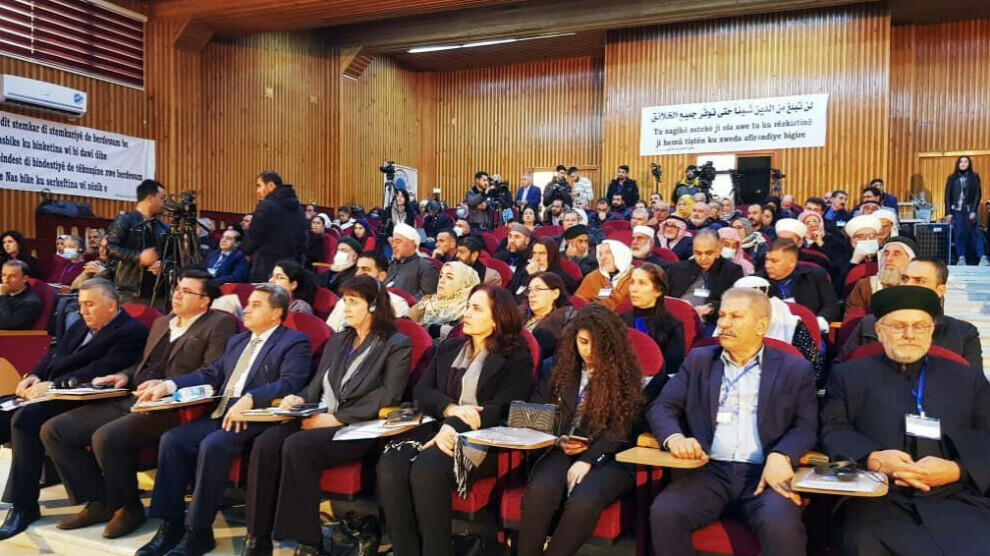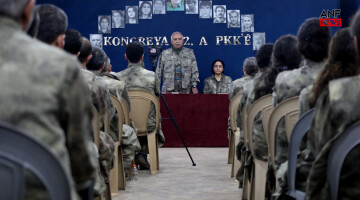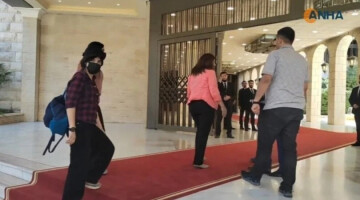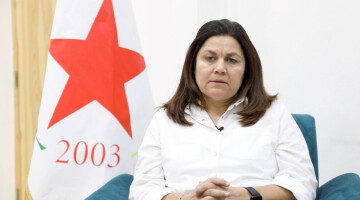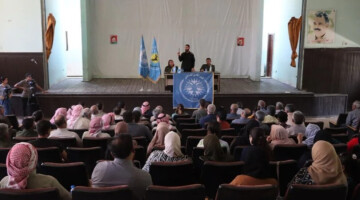The International Congress on Mesopotamian Religions and Beliefs kicked off at Rojava University in Qamishlo earlier today under the motto ‘Let's promote peace together’.
The congress is attended by several individuals and institutions including religious scholars and politicians from North and East Syria, International Freedom of Faith Committee Member Nadine Menza, TEV-DEM Co-Chair Xerib Hiso, Syrian Women's Council Spokeswoman Lina Berakat, Autonomous Administration Foreign Relations Office Co-Chair Ebdulkerîm Omer, Co-Chairs of the Cizre Region Autonomous Administration Executive Council Nezîra Gewriye and Telat Yunus, Syriac Unity Party Co-Chair Senharîb Bersûm and a representative of the Cizre Region Yazidi House.
Messages from KCK Peoples and Faiths Committee, patriarch Mor Ignatius Joseph, the patriarch of the Syriac Catholic Church, director of Al-Ezher Al-Sharif Foundation, the head of Lalesh Spiritual Assembly and Yazidi Sheikh Şêx Elî are being read during the congress.
Two presentations titled “Impediments to the use of religion as a peaceful way of life” and "What are the factors leading to the use of religion against people and violations of rights?" will be discussed today in the congress.
On the second day of the congress, a movie about the achievements in Rojava will be screened. Prof. Hamid bin Ahmad Al Rifaie, head of the Global Dialogue Forum and the International Conference on Leadership for Justice and Peace and Syriac Orthodox Church Bishop Mar Eustatios Matta Rohm will also make speeches.
'VALUES OF PEOPLES HAVE BEEN PRESERVED'
Making the opening speech, Ebdulkerîm Omer, Co-Chair of the Autonomous Administration Foreign Relations Office, stated that the values of thousands of Yazidis and the peoples of north-eastern Syria have been preserved thanks to the martyrs and serious sacrifices.
Omer underlined that the Turkish state manipulated all the crises in Syria and the region for its interests and intervened militarily in Syria, Iraq, Libya and Egypt. “The Turkish state has been attacking the region and its peoples since the beginning of the Rojava Revolution. Turkey has supported Jabhat al-Nusra and ISIS. Accompanied by extremist and terrorist groups, the Turkish army has occupied Girê Spî, Serêkaniyê and Afrin and committed numerous crimes. Furthermore, the Turkish forces have changed the demographic structure of these regions and displaced thousands of people,” he recalled.
“Turkey has been pursuing a policy of hostility towards all peoples in the region, targeting Kurds, Christians and Arabs,” Omer said, noting that the Turkish forces and its mercenaries have recently attacked Kobanê.
Omer revealed that their goal is to build a democratic, pluralistic and decentralized Syria.
'UNITY FOR COMMON VALUES'
Democratic Islamic Congress Co-Chair Şêx Mihemed El-Xerzanî stated that all peoples, religions and beliefs should promote unity in order to achieve common values.
Mihemed El-Xerzani remarked that they are working together with all institutions and that the purpose of the congress is to reject all kinds of persecution against any religion and people.
Speaking after, Kongra Star Coordination Member Muna Yusif pointed out that north-eastern Syria has been struggling against political, economic and social problems. “To cope with these historical crises and to shape our present and future, we need to analyse the causes of the crisis.”
Yusif noted that in order to overcome the current challenges, religions should play a leading role in society and the history of religions should be properly analysed and interpreted based on contemporary problems.
KCK MESSAGE
Ebdulkerîm Saroxan, Chairperson of the Democratic Islamic Congress Administration and Organization Bureau, read out the message of the KCK’s Peoples and Faiths Committee, which said the following:
“We greet all those who have contributed, participated and taken an interest in the holding of this conference. We hope that your activity will be transformed into organized action that will end the lack of dialogue among religions and beliefs, thereby helping to save people's sanctities and beliefs from the exploitation of authoritarian forces.
All religions and prophets came out against power and stood by the poor, the oppressed and the enslaved against injustice and the oppressed. Throughout the ancient history of the Middle East, prophecy has never been born as a "material movement," but has always been active as a moral force and has derived its societal strength from this aspect. For this reason, prophecy occupied a place in the minds of people in the Middle East, as it is the highest level of morals, and there is no doubt that the common feature among all religions and beliefs without exception is morals, in which lying, killing a human being, stealing, gossip and injustice are considered bad behaviour and sins in all religions and beliefs.
On the contrary, equity, justice, equality, good work and assistance to the sick, the poor, the oppressed, the unconscionable, the human conscience and all forms of behaviour that ensure peace and social solidarity are the common aspects of faith requirements in all religions and beliefs. This means that, despite our different beliefs and religions, the provisions of the moral values we believe in are somewhat common, and that the point which all religions and beliefs share is to build a person and a society of conscience and morality.
Because this problem has global dimensions and risks, it is a task common to all religions and beliefs around the world. The quest to build a moral society of conscience is the fundamental task in the face of a corrupt and unscrupulous consumer society, morality and human values. Since that mission is inherently a task in all religions and faiths, we must accept each other with our differences and diversity and prevent religion and belief from being the cause of conflict and war among ourselves.
Let us work together in all our efforts to give effect to the central role of all religions and beliefs embodied in the development of love, peace and fraternity among all peoples of the Earth. Let us not forget that all beliefs and religions on Earth, by their very nature, are allies in the purpose for which humanity was created, and in the realization of this natural alliance, a common organization and a united front must be accelerated.”
The International Congress on Mesopotamian Religions and Beliefs continues with messages addressed by religious leaders and beliefs from around the world.

